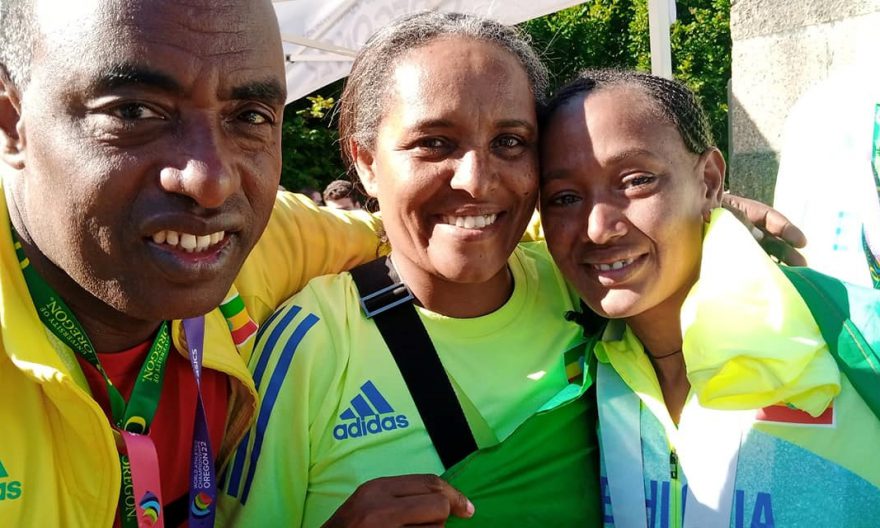
BY FITSUM GETACHEW
A sort of new breeze is being respired these days in Ethiopia. Ethiopians may have lots of challenges in their lives including conflicts and displacements; they may worry about their country’s political development where some extremist politicians are viewed creating controversies that have continued to be part of Ethiopian politics now for too long in a move that seems to have halted the times. And in recent days more worries may have been added to the ones already in existence and that is related to the economic anxieties with the worldwide hikes in prices of mainly fuel and food.
All these scenarios may push anyone into despair and leave people in a somber mood. However, when there are sporting events and competitions in which the national teams are involved, then comes up first and foremost Ethiopians’ national feeling. Emotions begin to rise high up and all the discussions and talks among friends and relatives and even colleagues in offices focus on the sporting events of the day. Discrepancies are set aside or forgotten.
We remember a few weeks ago when the Ethiopian national football team beat its Egyptian counterpart in a match for the qualification of the African Cup of Nations 2023 Ivory Coast, the entire country was moved as one running to the streets in delirium. All the worries, all the disputes among Ethiopians were sidelined with an outburst of emotions, an eruption of love for the country. It was as if there was a contract between all sectors of society to express their joy on the squares and streets of the country.
People particularly the youth from all corners of the country were spontaneously seen experiencing the joy for the victory on a traditional rival. Radio stations were bombarded by calls of congratulations and texts were everywhere on social media all talking exclusively about the unity of the country, the unity among the players who had performed in an outstanding manner outshining the highly quoted Egyptians.
These days again, Ethiopians are focused on the 18th World Athletics Championship underway in Eugene, Oregon, USA. Every time there are major international competitions such as the World Athletics Championship, the Olympic Games or any international tournament Ethiopians unite in their chase of victory, for medals and for outstanding performances. In a way, it is the always declared dream of anyone who represents the country in a competition to win and be the pride of the compatriots. It is the moment all athletes dream because they are convinced they can win a medal and have the national anthem of their country sung in a world platform in which millions of spectators around the world are watching on their TV screens or smartphones. They dream seeing their national flag hoisted high up in the community of nations.
No doubt, Ethiopia may be a poor country and may have scarce resources to prepare its athletes like the advanced countries may afford, but the resolve and resilience they have, the hard work and commitment they put into it have always helped them win races with the best-prepared athletes of the world in contention. That is when all Ethiopians jump in joy and delight in unison. That is when they feel once again their patriotic pride and discard any outstanding disputes that may have worried them for a while. That magical moment reflects the true feeling of patriotism and a sense of unity and belonging to one another transpires.
Over the years, Ethiopians and athletics, especially in the middle and long-distance races, have been considered two sides of the same coin. A certain reputation has been building up in this area linking indissolubly the name of the country to athletics. Ever since the days of Abebe Bikila, the first African athlete to have won a gold medal at the Olympics, a tradition seems to have come to build up following his example. Mammo Wolde is another sporting icon, one of the vanguards of Ethiopian athletics who have represented their country in the international arena with brilliant triumphs. Everyone remembers the triumph of Abebe Bikila in the Rome Olympics of 1960 when he entered the final meters of the killer race barefooted. Again, he was seen reaching the victory podium in Tokyo four years later and at the end of the race doing some gymnastics while the rest of the athletes were in pain or collapsing once they finished the race.
Italians always remember Abebe with nostalgia for his exceptional performance on their soil as do the Japanese. These events have inspired generations of athletes particularly in Africa. Ethiopians were once again filled with utter joy and thousands showed up to the airport in Addis when he came back triumphantly with the routes taking to the imperial palace thronged with a celebrative crowd when he was accompanied to the Emperor’s palace and awarded immediately.
A successive generation of brilliant athletes has followed these historic events of the past. Miruts Yifter, Haile Gebreselassie, Derartu Tulu, the Dibaba sisters, Meseret Defar, Kenenisa Bekele etc were among those who followed the exploits of Abebe and Mammo. Whenever there were sporting events Ethiopians forget all their discrepancies and worries and come together praying as one nation for triumphs, and enjoy the runs together up to the end.
In the current World Athletics Championship in Oregon, a new wave of enthusiasm and patriotism is being felt among Ethiopians. Ethiopian athletes have been preparing hard for these championships because they know citizens have huge expectations given the tradition the country enjoys. For Ethiopians taking part in a competition does not suffice because everyone expects medals considered as part of the psyche of the athletes and their fans.
Recently new disciplines have been added to the once well-consolidated victories in the marathon, the ten thousand and five thousand events. These days we have included shorter distances such as the 1,500-meter race as well as the 3,000-meter steeple chase event. New blood has been introduced to the fleet of Ethiopian athletes and it appears that the nation continues to produce new faces, new protagonists.
The Oregon World Championship has become a source of festivities and joy among Ethiopians. Everyone is heard talking about the unity of all in order to shine at the international level. It began with the teamwork of the female ten thousand meter race where Letesenbet Gidey triumphed with a new championship record. This phenomenal victory was repeated in the men marathon race with a new world record by Tamrat Tola, again a result of teamwork among Ethiopian athletes who run together. Again, similar victory was repeated in the female marathon when Goytom Gebreselassie broke the record that reigned for sixteen years. That was a true source of pride for all Ethiopians and once again calls for unity among nationals were invoked and admired on every social media available including the mainstream media full of congratulatory messages and best wishes. A wave of enthusiasm could be sensed along the nation filling the air of pessimism and worries with a new day of hope.
The victories came successively in every event where Ethiopians took part and this contributed to the flaming of feelings in nationalism with wide celebrations. Once again sporting events in which Ethiopia has taken part have created a sense of unity and purpose and everyone was heard asserting that a united Ethiopia is always strong and unbeatable by any adversary. When people saw the celebrations of the athletes, the emotions they were carried away with, the sense of nationalism that is read on their faces, those are the moments that unite all Ethiopians under one flag. Differences are set aside and that could present the perfect opportunity to use this social capital to carry on with the development trajectory of the country and build on it to attain what seems to have been lacking for a while now: a national dialogue and a national consensus.
THE ETHIOPIAN HERALD THURSDAY 21 JULY 2022





